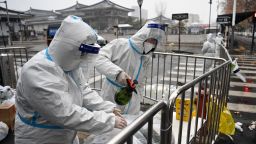The United States and a number of European countries smashed their Covid-19 case records Tuesday as the highly-transmissible Omicron variant spreads across the world.
The US: The nation reached a seven-day average of 254,496 new cases on Tuesday – the highest this number has ever been over the course of the pandemic – according to data from Johns Hopkins University. The figure beat the previous record of 251,989 new infections, set on January 11, 2021. Hospitalizations and deaths have not seen a similar increase in pace but these are lagging indicators that may drag weeks behind case increases.
Nationwide pediatric Covid-19 hospitalizations are nearing the record high set in September, however. On average, roughly 305 children were admitted to the hospital with Covid-19 on any given day over the week that ended December 26, according to data from the Centers for Disease Control and Prevention and the US Department of Health and Human Services.
France: Authorities reported a record high of 179,807 new confirmed cases in a 24-hour period on Tuesday. Despite a rise in hospitalizations and ICU occupancy, French data is showing fewer deaths. In the last 24 hours, France recorded 290 Covid-19 related deaths, 484 people hospitalized and 83 people in ICU beds. A year ago, the country recorded 363 deaths, 25 hospitalizations and 44 people in intensive care.
United Kingdom: On Tuesday, the country again broke its Covid-19 case records with 129,471 new infections, according to official data. Covid-19 hospitalizations in England have risen by 25% over the course of one week but the government has said there will be no further restrictions there before the new year.
On Wednesday, UK Prime Minister Boris Johnson said the Omicron variant is milder than the Delta strain but “continues to cause real problems,” and urged the public to get vaccinated or boosted if eligible to avoid hospitalizations.
Spain: The country’s health ministry reported 99,671 new cases on Tuesday, the highest number in a single day since the start of the pandemic. It’s double the previous record, set just last week.
Italy: Italy is also reporting its highest daily new cases since the start of the pandemic, with 78,313 infections recorded Tuesday. It also has lower figures in hospitalizations and deaths when compared with data from 2020. In the same period last year, Italy recorded 8,585 new infections, 445 Covid-19 related deaths, and 2,565 intensive care beds occupied. On Tuesday it reported 202 deaths, and 1,145 ICU occupancy.
Portugal: Portugal has also recorded its highest-ever number of new daily cases, with a total of 17,172 new coronavirus infections, its health ministry said Tuesday.
Despite rising cases, authorities have seen a 70% reduction in the number of deaths, hospitalizations, and ICU admissions over the Christmas period compared to the previous year. Between December 20 to 27, 2021, there have been 14 deaths and 151 ICU admissions, according to health authority data. There were 68 deaths and 506 ICU admissions in the same period in 2020.







































